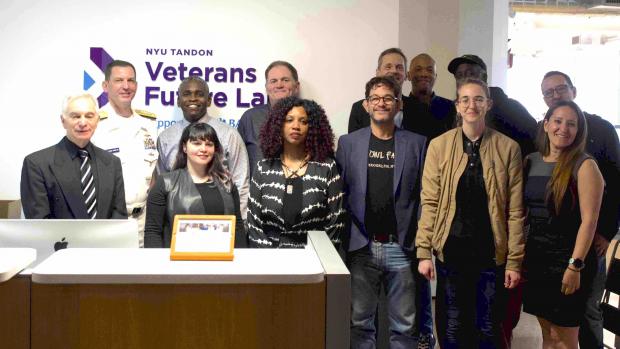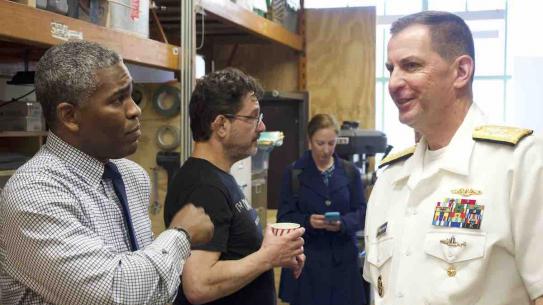Vice Admiral Kriete visits the Veterans Future Lab
Three-star admiral meets entrepreneurs and talks about the open seas, space, and technology

Vice Admiral Kriete (in uniform) at the Veterans Future Lab with portfolio startup founders and members of the community.
On May 15, the Veterans Future Lab had the honor of a visit by Vice Admiral Dave Kriete, Deputy Commander of United States Strategic Command, who came to find out more about New York’s first high-touch incubator for early-stage businesses led by veterans and entrepreneurs with military ties.
As a representative of the US Navy, Vice Admiral Kriete spreads the word about its mission at a time when many Americans don’t have connections to the military. In this capacity, “I was asked to come visit my hometown of Brooklyn,” he says. “The Navy Community Outreach office has connections to New York University, and one of the members [...] was familiar with the [Veterans Future Lab] program. Knowing that we all have a common goal of helping veterans make the transition, to help them be successful in whatever the future holds for them when they leave military service, she thought this would be a great place to visit, and she got it exactly right.”
The Vice Admiral discussed the US Navy's three primary goals. The first is to keep the maritime commons free for international trade — critical, when 90% of the world’s goods flow over the oceans, and, as he says, “There are actually many countries and some non-country entities that would like to threaten shipping, either through piracy or through control or strategic border raids — like the South China Sea, for example.” The second role results from the Navy’s global presence: “Many times, when a US Navy ship pulls into a port somewhere, the local folks in that country may not have ever had any interaction with Americans [...] And so we have an opportunity to present the people around the world what America stands for.” And third, the Navy remains ready to defend the US and its allies. “Recent news events will show that when a crisis flares up somewhere, like the Middle East,” Vice Admiral Kriete says, “you don't have to look very far to figure out where the United States Navy is.” He reiterates, though, that the goal is to never have to use strike capabilities — “We have them available so that when our country is dealing with others, we're doing it from a position of strength and not a position of weakness.”
An interesting intersection of worlds marked the visit: In addition to the military connection, Vice Admiral Kriete majored in general engineering at the US Naval Academy, and he holds a master’s degree in engineering management from Old Dominion University. He also grew up in Sunset Park, where the Veterans Future Lab now lives.
“It is absolutely wonderful to be back here in Brooklyn,” he says. “I grew up just a few blocks from here [...] All the changes that I've seen are really, really good. For example, this particular part of Brooklyn was always very industrial. But from my memory, back in the 1960s and 70s when I grew up here, there were none of these start-up businesses or places that would attract more people to come in [...] It's very encouraging to see how there's kind of a resurgence this part of Brooklyn.”

After Vice Admiral Kriete was given a tour of the Veterans Future Lab and ProtoShop prototyping space, and introduced to some of the veteran entrepreneurs in the incubator, he spoke about his work, what veteran entrepreneurs can take from their years in service, and the technologies the military is watching.
(Answers edited for length.)
On the skills entrepreneurs acquire in the military
I think that there are a common set of skills that are developed in all military folks. Usually, in their first few years of service [...] they learn responsibility. [...] Sometimes that responsibility extends to being responsible for a mission or a project or something other than the people that they work with. And I think that's one important component to being a successful entrepreneur.
I think folks also learn a sense of commitment, because you have to be committed to be successful in the military, whether that's commitment to your unit or your ship or your shipmates [...]
The other thing that I think is helpful [..] is a sense of a calling to do something that's bigger than their own self-interests. That's inherent in military service. It's sometimes — but sometimes not — a part of people's work lives once they leave the service. And for those who can find a way to still satisfy that wanting to serve a higher calling [...] there’s a sense of purpose about their work. I think those are the folks that tend to be the most successful.
On the responsibilities of US Strategic Command
The US Strategic Command is [a] global combatant command [with] missions around the globe. Among them are oversight of our nuclear deterrent capability, and the strategic deterrence that goes along with that [...] Space operations is a big one that a lot of folks are interested in these days, and StratCom is responsible for all military operations in space. We're also responsible for missile defense, and that's defending [...] the United States and many of our allies and our forces that are stationed overseas.
Now, all of those capabilities, particularly ones that involve strike, we hope to never have to actually use them. The first and foremost mission of the command at StratCom is to deter any type of aggression by other countries against the US or our allies. And we do that by revealing just enough of what our capabilities are, when we might be willing to use them, to influence the thinking of other countries that might choose to do us harm [...] So hopefully they'll make the right decisions.
On the technologies the military is placing emphasis
Some of the emerging technologies that are of interest both within the military and outside the military are things like quantum computing, artificial intelligence, big data analytics. We're starting to find some applications for those within the military. But we actually try to learn as much as we can from the civilian world and what the state of of industry is in these areas, and then figure out ways to adapt that to the unique problems that we're trying to solve in the military.
There are some problems that we've had for a long time that we just haven't figured out a solution for. Personally, I'm very hopeful that some of these techniques like big data analytics might help us get to a solution.




